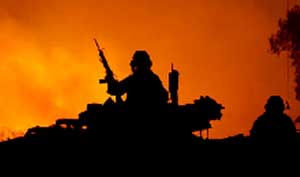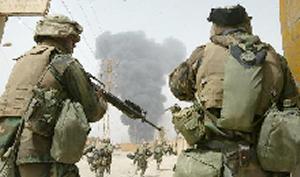The blitz took two task forces of the 3rd Infantry Division from the southern outskirts of the city past Baghdad University and near the banks of the Tigris River, then back to the western outskirts of the city to the airport, which is under U.S. control. While some Iraqi civilians welcomed the troops, others put up a fight, including a mixture of Republican Guard and irregular forces, Wilkinson said. Wilkinson did not specify how U.S. forces came up with their estimate of Iraqi deaths; previously, enemy tolls have not been issued. He did indicate that forays into Baghdad would continue. "It's important to do so to secure the area; it's also important that we do that for psychological reasons," he said. "Frankly we've had to prove to the civilians in the north and the south that we're there to stay. Once they know we're there to stay, they celebrate." U.S. pressure in
and around Baghdad intensified in other ways Sunday, including an attempt
by Marines to take a bridge over a canal leading into the city. Iraqi fighters
had rigged the bridge with explosives and dug out the embankment under
the bridge to weaken it; Marines said they control the bridge but cannot
cross it.
According to Turkish television reports, three U.S. soldiers and 12 Kurdish fighters were killed, and more than 40 people were injured in the bombing. Some of the casualties reportedly were taken to a hospital in the Kurdish-controlled city of Irbil, including the younger brother of prominent Kurdish leader Masoud Barzani. In Basra, British forces have set up checkpoints in the city for the first time. Until now, they had stayed on the outskirts, hoping that the predominantly Shiite Muslim populace of Basra would turn against the pro-Saddam militiamen defending Iraq's second-biggest city. "We are aggressively patrolling, we're moving into the city now," said Group Capt. Al Lockwood, spokesman for British forces. On Saturday, coalition aircraft struck the Basra home of Ali Hassan al-Majid, the Iraqi general known as "Chemical Ali" for ordering a poison gas attack that killed thousands of Kurds in 1988. Allied officials said the general - Saddam's cousin - was believed to be home at the time, but it was not known whether he was killed or wounded. On Sunday, coalition forces positively identified the body of the general's bodyguard, Wilkinson said. "They're still sifting through the rubble down there to see if Chemical Ali was dead," he said. Wilkinson said hundreds of people in the neighborhood began cheering after the strike. Explosions jolted Baghdad early Sunday after a relatively quiet night in which the usual barrages on anti-aircraft fire were not heard. Capitalizing on their dominance of the skies, U.S. commanders began deploying planes over Baghdad 24 hours a day, ready to direct strike aircraft to ground targets. The strike planes use precision bombs that are considered effective against fixed targets while minimizing risk to nearby civilian structures. Iraqi authorities took Baghdad-based journalists to the city's southern outskirts Sunday to show them a U.S. tank destroyed in the recent fighting. A commander said four more tanks also were destroyed but had been towed away to clear the road. Coalition warplanes then swooped low overhead, prompting journalists and Iraqi soldiers to scurry for cover. Along the Tigris River, 20 miles southeast of Baghdad, Marines of the 3rd Battalion, 7th Marines overran the headquarters of the Republican Guard's Second Corps, seized one of Saddam's numerous palaces and destroyed what U.S. intelligence reports depicted as a terrorist training camp. The nighttime attack was mounted in the town of Salman Pak, which military officials said contained a suspected weapons of mass destruction site dating back to 1991. Before the battle, Marines had estimated there were between 500 and 2,000 Iraqi soldiers in Salman Pak. At least 13 were killed, the Americans said; others fled from trenches and sandbagged positions on rooftops. It was unclear what the Marines found at the training camp, which contains an airstrip the Bush administration says was used in terrorist training provided to Islamic militants from other countries. In Moscow, the Kremlin said a convoy of Russian Embassy diplomats came under fire Sunday, and some were wounded, as they were evacuating from Baghdad and starting to drive toward Syria. Russia's Foreign Ministry said the U.S. and Iraqi ambassadors were summoned and asked to take all measures necessary to guarantee Russian citizens' safety in Iraq and to investigate the circumstances of the attack. |

